Alberta pension panel chair Jim Dinning says he won't prejudge work as Poilievre, others weigh in
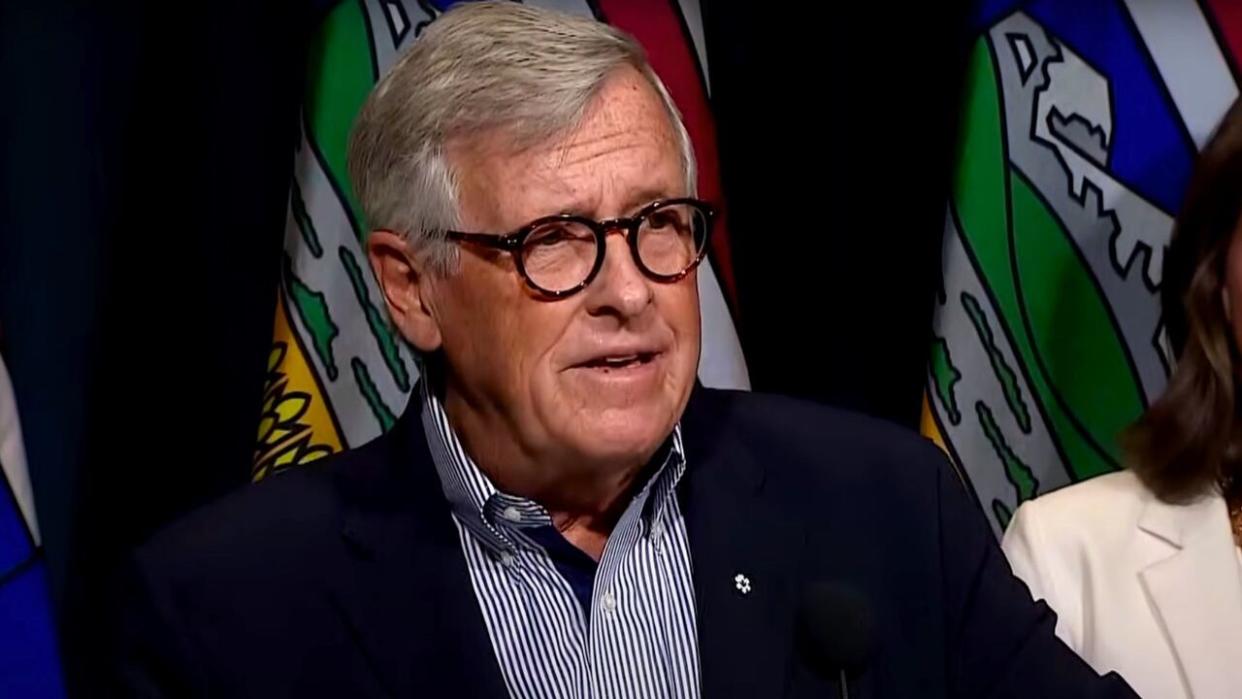
Just days before he leads up the second telephone town hall on Tuesday about whether Alberta should quit the Canada Pension Plan (CPP), Jim Dinning says his panel is in "serious listening mode" — and they're not "pompom wearing cheerleaders" — when it comes to a possible provincial pension.
"All of the drama … I encourage people to phone the political masters, because I'm going to leave the politics to the politicians," Dinning told host Kathleen Petty on the CBC's West of Centre podcast this week.
LISTEN | Hear the full interview on the CBC's West of Centre podcast as Jim Dinning, chair of the Alberta pension panel, discusses the ongoing consultation and its various detractors. Then, an interview with Labour Minister Seamus O'Regan on the federal side of the debate:
The drama, as Dinning put it, included Prime Minister Justin Trudeau sending an open letter to Alberta Premier Danielle Smith on Wednesday, writing that the harm such a move would cause "is undeniable." Further drama included the board of the Canada Pension Plan writing on Tuesday to Dinning that Alberta's pension exit consultations were biased.
But the Dinning interview took place Thursday, before Conservative Leader Pierre Poilievre stepped into the fray on Friday, advising Albertans to stay in the CPP.
In responding to Poilievre, Smith wrote in a statement that Albertans would ultimately decide whether or not to pursue the opportunity further after "broad consultation and discussion" are complete.
That consultation is scheduled to continue via telephone town hall on Tuesday, the second of five, 90-minute discussions held across various regions of the province over six weeks.
In the interview with West of Centre, Dinning acknowledged that holding those consultations via phone-in forum has drawn criticism. Last week, Opposition NDP finance critic Shannon Phillips said not engaging in face-to-face dialogue represented an act of "pure cowardice."
Dinning said the panel will likely do face-to-face meetings in the future, though it has yet to nail down dates or places.
The plan is to do them in Calgary and Edmonton in December, Dinning said, and then see what comes next for further meetings, whether that's face-to-face or via telephone town hall.
Disputes over calculations and transparency
When the Alberta government released its report almost a month ago on the possibility of going it alone, it claimed the province was entitled to a $334-billion asset transfer from the CPP in 2027, which would represent more than half of the fund.
Since then, various other calculations have drawn attention. A 2019 briefing note for Travis Toews, then Alberta's finance minister, estimated the province's share of CPP assets was less than 12 per cent.
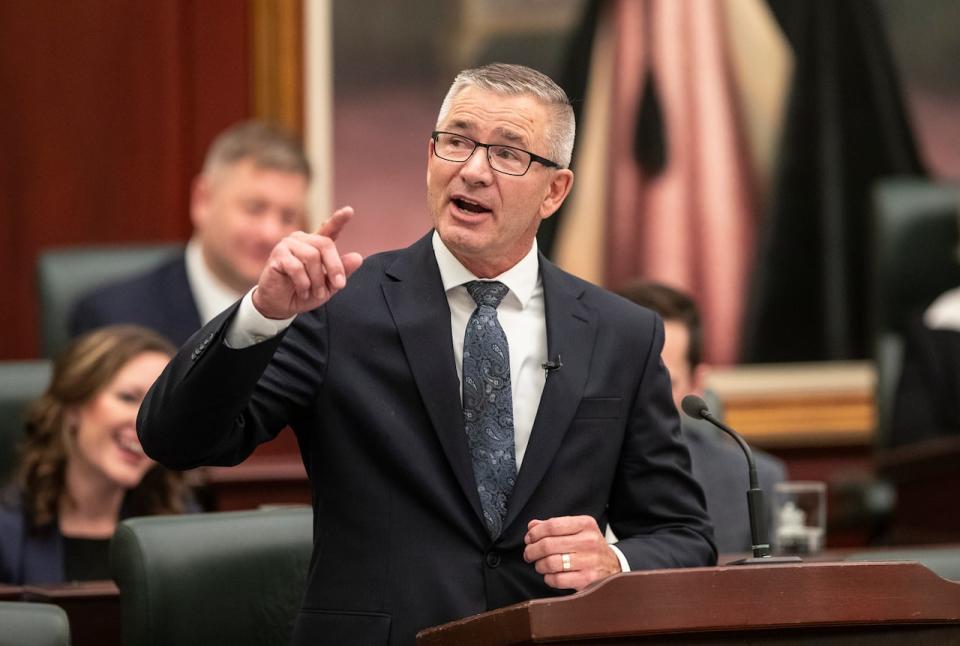
A briefing note was prepared in 2019 for Travis Toews during his time as finance minister. It estimated the province's share of Canadian Pension Plan assets was less than 12 per cent. (Jason Franson/The Canadian Press)
Trevor Tombe, an associate professor of economics at the University of Calgary, has suggested Alberta would be entitled to 20 to 25 per cent of CPP assets.
Dinning said he had a "very high regard" for Tombe.
"He's done some very, very good number crunching. And I would want to make sure that those are factored into what Albertans told us, because he's one of my fellow Albertans, and it'll go into the report," Dinning said.
But Dinning said Tombe's report was "probably the very second best, the very closest" to the work done by pension analyst LifeWorks, which had attributed the $334-billion figure to Alberta's high employment rates, young population and higher pensionable earnings.
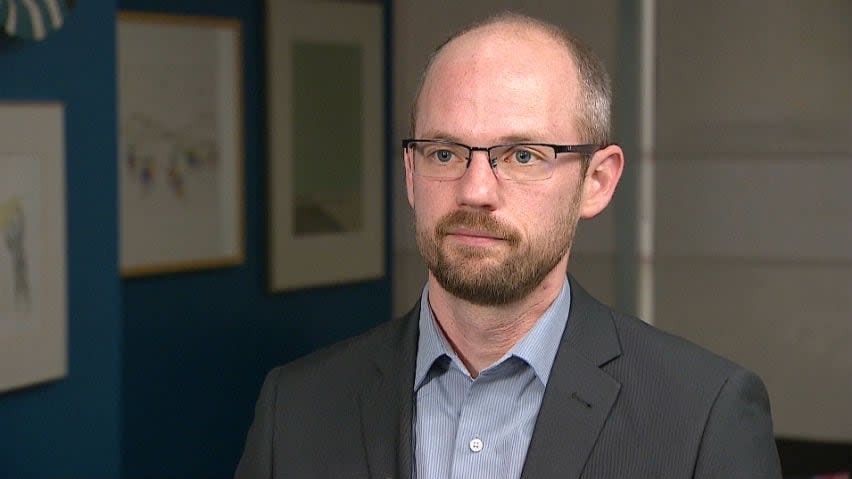
As a part of his calculations, Trevor Tombe, an economics professor at the University of Calgary, estimated that if British Columbia, Alberta and Ontario each withdrew from the Canadian Pension Plan, 128 per cent of assets would need to be paid. (Colin Hall/CBC)
"Even the [LifeWorks] report isn't perfect. It's missing some data. But [it is] as close to an actuarial, reliable report that the panel has seen," he said.
Other numbers have also been floated over the years, including as a part of the "fair deal" panel, which pegged the figure somewhere between $40 billion and $70 billion.
Federal government hasn't released numbers
The federal government, for its part, has yet to come to the table with its own numbers. In response to Trudeau's open letter, Smith called on Ottawa to release its own calculations.
Dinning said he would like to see the federal government's calculations, and would include that in the ongoing consultations.
When asked on West of Centre about releasing calculations given Trudeau's instruction to cabinet to take "all necessary steps" to ensure Albertans, and Canadians, were "fully aware of the risks" of the plan, Labour Minister Seamus O'Regan would not commit.
Instead, he said he would leave the numbers to federal Finance Minister Chrystia Freeland.
"I would say, the returns speak for themselves," O'Regan said.
"I would also say, if we're going to have those comparisons, then it has to involve more than just, let's say, the actuarial statements. It has to involve things like portability."
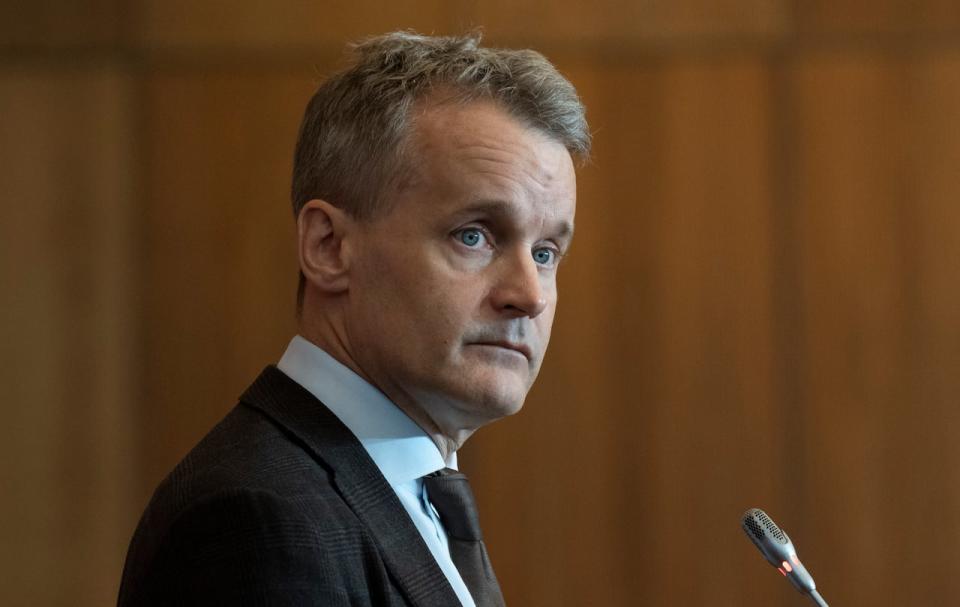
Labour Minister Seamus O’Regan said he didn't want to 'get over his skis' by discussing calculations, something he said fell to federal Finance Minister Chrystia Freeland. (Adrian Wyld/The Canadian Press)
In the end, the actual terms won't actually be known to Albertans until they are calculated.
Dinning was asked in the interview whether it would make more sense for the exit to be negotiated prior to consultation, so Albertans can be confident about what they're approving or rejecting.
"Look, you make an interesting point. If you want to ask the minister of finance or the premier that question, you're welcome to do so," Dinning said. "We're dealing with the facts [as we've] got them today."
Concerns with online survey
As a part of its criticisms, the CPP Investment Board zeroed in on the provincial government's online survey, which doesn't engage with the potential consequences of leaving the CPP.
The board said it had hired a third-party market research firm to analyze the survey, and said the firm concluded that it failed to meet the objectives of effective public consultation.
Alberta Finance Minister Nate Horner said in response that the board had a "vested interest in maintaining the status quo" and called for the board to release "its own, expert actuarial analysis" on the creation of an Alberta Pension Plan.
Dinning said he had completed the survey, which he noted was launched Sept. 21 — the same day Alberta announced it would explore leaving the CPP.
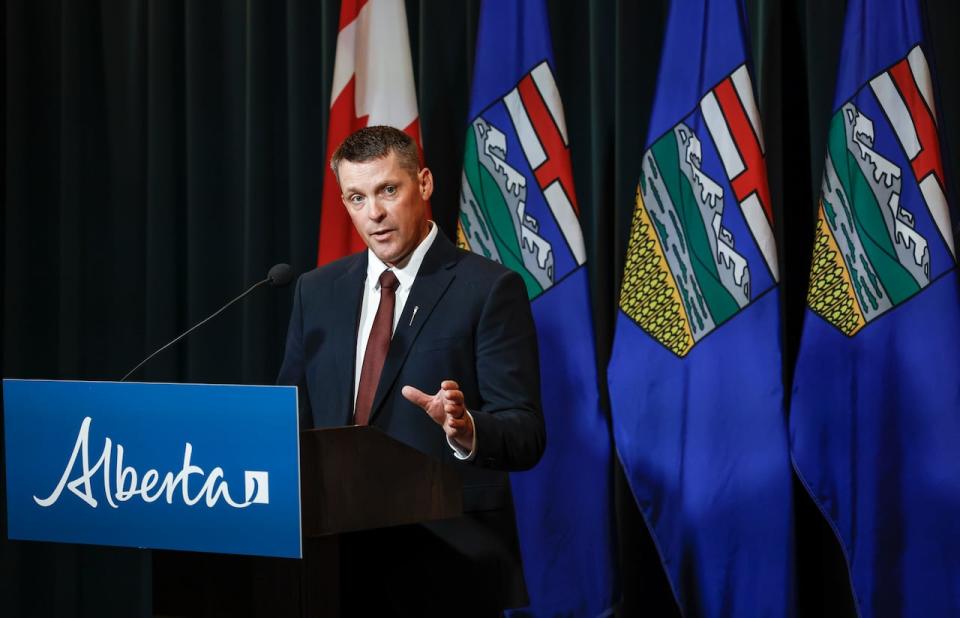
Alberta Finance Minister Nate Horner speaks to the media in this file photo. Earlier this week, in response to the CPP Investment Board's criticisms of the Alberta pension consultation, Horner said the board had a vested interest in maintaining the status quo. (Jeff McIntosh/The Canadian Press)
When asked if the survey met the bar of true consultation, Dinning said "that is the approach that the government took with their survey."
"If you stayed with us for some of the 90 minutes on Monday night, you would have heard our questions are different. Our questions are open-ended. Our questions are inviting comments," Dinning said, adding he wouldn't prejudge what the government's survey might eventually deliver.
In its letter addressed to Dinning, the CPP board wrote that it was seeking an opportunity to "provide a submission to highlight the benefits of the CPP to Albertans."
Dinning said he was open to having the board make that submission.


